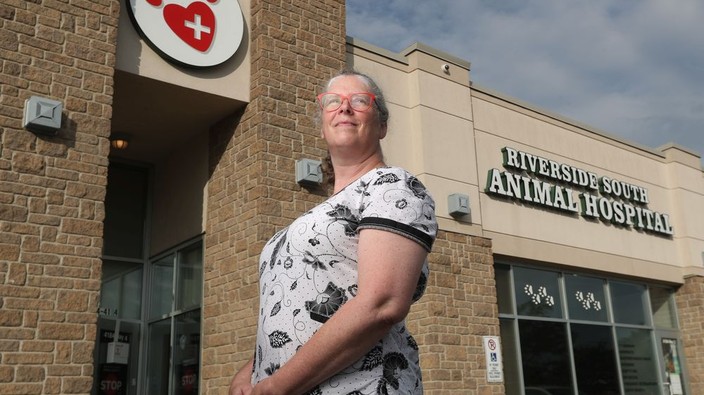pandemic puppies and the crisis in veterinary medicine
in 2015, a workforce survey suggested that demand for vets in ontario would be flat. "we got that wrong."

dr. sherri dennett says her business could grow by about three new clients a day, but she doesn't have the capacity to serve them.
tony caldwell
/
postmedia
by: joanne lauciuswhen dr. sherri dennett opened her veterinary practice in riverside south 14 years ago, she handed out flyers and took out an ad on a riverside drive billboard.opening a veterinary practice in the neighbourhood was, by all indications, a smart business move. riverside south was a growing community with an influx of young families and their pets.but now dennett and many vets find themselves caught in a bind. by dennett’s count, her business could grow by about three new clients a day, but she doesn’t have the capacity to serve them. two years ago, if she was refusing new clients, she would have hired another vet. now hiring a vet and support workers is nearly impossible.“i never would have thought we would see this.”in the past, vet positions were only hard to fill in rural and remote parts of the province, said jeffrey wichtel, dean of the ontario veterinary college at the university of guelph.in 2015, a workforce survey suggested that demand for vets would be flat. “we got that wrong,” wichtel said. “in 2017, we saw how wrong. by 2019, it was a crisis.”the pandemic made it worse as people working from home took the opportunity to acquire pets. at the same time, the veterinary workforce was down by 20 per cent due to illness, quarantine and family needs. more sick pets got shunted to emergency and urgent-care clinics, which got “completely slammed,” he said.one of the problems is a lack of veterinary technicians, who take on the “nursing” role in a vet practice, dennett said.“every vet should have two techs, one veterinary assistant and a receptionist. an emergency clinic should have four vet techs for every vet.”but veterinary technologists have been difficult to recruit and keep. after graduating, many soon drift away to jobs outside the field, wichtel said.dennett, known to clients as “dr. d,” also has a mobile practice in ottawa. last thursday night, she drove 45 minutes from riverside south to euthanize a greyhound named ozzy.ozzy has had epilepsy for two and a half years and was experiencing increasingly frequent seizures. he also had severe anxiety. while his vet could take blood tests on the sidewalk in front of the clinic, euthanasia in a medical environment was unthinkable.“any sound or noise would scare him. you can imagine taking him in a car and bringing him to a vet,” said his 17-year-old owner, matthew menard.dennett worked 60 hours a week before the pandemic and still works 60 hours a week, but about 20 of those hours are spent doing tasks more suited to vet technologists, such as taking x-rays and prepping animals for surgery.“it takes away from the time i have to do medicine,” she said.there has been growing evidence that the life of some vets is far from sunny.a 2019 u.s. centers for disease control and prevention study found that almost 400 veterinarians died by suicide between 1979 and 2015. a 2020 study by the ontario veterinary college found over one-quarter of canadian vets reported suicidal thoughts in the previous 12 months.vets are under constant pressure to do more for less, even though it may not be up to the “gold standard” of treatment, wichtel said. knowing that clients can’t or won’t pay for the best possible treatment causes a “moral injury” for vets, and there is cumulative harm over time.“the standard of care has expanded over time, and so have the costs. it sets up tension in the workforce every day,” he said. “people say, ‘vets have a licence to print money.’ but i know there are few wealthy veterinarians. the cost of running a practice means there’s not a whole lot of money left over.”the solution for many vets in this crisis has been to serve only existing clients and refuse new ones. but those who reject new clients or fail to live up to expectations of 24-hour-a-day service are being called money-grubbing — or worse, dennett said.“people used to yell at me once a week. now they’re yelling at me every day,” she said. “people can say it’s about the money. but how can it be about the money if you’re saying, ‘no?’ ”in a letter to members earlier this month, the college of veterinarians of ontario, the body that regulates vets, sent out a clarification on after-hours care to its members, indicating that vets were responsible for providing “reasonably prompt” services outside of regular hours if the services were medically necessary for animals they had treated recently or regularly.this could include on-call services in co-operation with other vets, referring clients to another facility that provides 24/7 services and has agreed to accept referrals or referring clients to an accredited tele-triage service. but dennett points out it’s hard to be on call overnight and still work the next day.the college has had slowly increasing year-over-year complaints from the public in the past five years. but there was a 25 per cent jump over the regular increase in 2020 — and that appears to be sustained this year, registrar and ceo jan robinson said.if the pipeline for more veterinary graduates opens, it won’t by much. the ontario veterinary college accepts 120 students every year, among the highest in the north america. there are plans to increase the number of spaces, but the expansion will be modest, wichtel said.vet schools are addressing the “moral injury” question, speaking to students about the spectrum of care for pets — the idea that expectations are negotiated appropriate to individual contexts — he said.“vets should not beat themselves up if they can’t offer the gold standard of care.”dennett has a few things to ask of pet owners: be kind. respect protocols. respect nurses, both veterinary and human. remember that the hardest job in any business is the receptionist. your vet knows more than your breeder. warning bells should go off if you are asked to pick up a puppy or kitten in a shopping mall parking lot. consider postponing getting a puppy or kitten for now.solutions to the crisis in veterinary medicine will take time, wichtel said. and people will keep on getting pets.“people’s relationships with their animals is getting more and more personally intense. i don’t see it going away.”
 5 minute read
5 minute read





